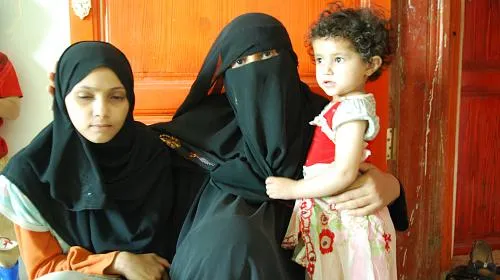SANA’A, Yemen (March 9, 2018) — More than 3.25 million women of reproductive age in Yemen face increased health and protection risks, warns international humanitarian organization CARE. Conditions for women and girls are deteriorating rapidly as the conflict in Yemen nears its fourth year.
An estimated 1.1 million pregnant and lactating women are malnourished as lack of humanitarian access to conflict-affected areas and difficulties obtaining food and medical supplies persist, according to the United Nations Population Fund (UNFPA). A further 75,000 pregnant women are at risk of developing complications due to the dire state of health services in Yemen.
“Yemeni women and girls are the ones who are truly paying the price of war,” says Suha Basharen, gender specialist with CARE in Yemen. “The situation for women is extremely difficult. They are now having to step into roles that are traditionally filled by men, because so many men are now being killed or injured or forcibly disappear.”
According to UNFPA, more than 3 million Yemeni women and girls are at risk of gender-based violence, and 60,000 women are at risk of sexual violence, including rape. Many cases of gender-based violence remain unreported, adding to an incomplete picture of the scale of violence against women.
Rising food prices and the continuing blockade on imports of essential food items exacerbate the situation with more than 8.8 million women and girls in need of urgent food assistance.
“In traditional Yemeni society, men and boys eat first, and only then can women and girls eat. Even with food shortages, men still eat first, and women and girls – including pregnant and lactating women – still eat last. There is nothing left for them by the time it is their turn,” says Basharen.
Despite slight improvements, some of the main challenges in providing services for reproductive health and gender-based violence in conflict areas are due to damaged or non-operating health structures, limited movement of aid agencies on the ground, and limited transportation of supplies to health facilities. It is also exceedingly difficult for Yemenis to access health services abroad due to the incredible difficulties they face trying to leave the country.
CARE is running programs promoting women’s economic empowerment, helping aspiring women entrepreneurs access training, temporary employment, and funding for their businesses, with a focus on women-led households, and is actively encouraging and training Yemeni women to lead on peace-building efforts. CARE is working to build on community capacity and knowledge to combat negative gender norms that present obstacles for the meaningful participation of women in peace-building. CARE is also working with civil society and local authorities to promote gender equality in the peace processes in Yemen and is also strengthening coordination with local authorities to be more responsive to women and girls’ basic needs.
Yemen is home to the world’s largest humanitarian crisis, one that could be the worst in 50 years. Nearly 22.2 million people — three-quarters of the population — are in need of humanitarian assistance, and more than half of these — 11.3 million — are in acute need and urgently require humanitarian assistance to survive. Recent blockades and clashes deepened the already-dire catastrophic humanitarian situation.
About CARE
Founded in 1945 with the creation of the CARE Package®, CARE is a leading humanitarian organization fighting global poverty. CARE places special focus on working alongside women and girls because, equipped with the proper resources, they have the power to lift whole families and entire communities out of poverty. That’s why women and girls are at the heart of CARE’s community-based efforts to improve education and health, create economic opportunity, respond to emergencies and confront hunger. Last year CARE worked in 93 countries and reached 63 million people around the world. Learn more at care.org.
Media Contact
Mahmound Shabeeb, humanitarian communications manager, mshabeeb@care.org, +962-79-146-39-03, Skype: Mahmound.Shabeeb_1

